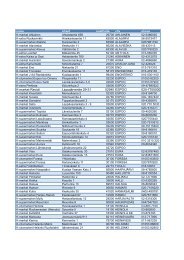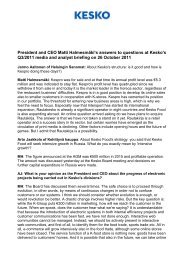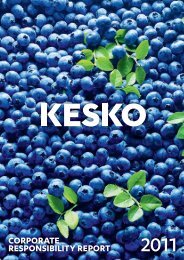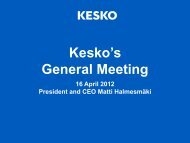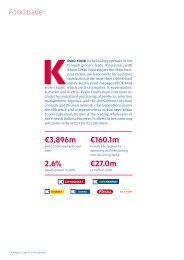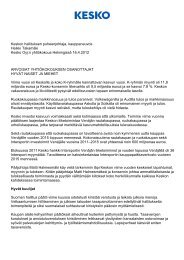Kesko's Annual Report 2009
Kesko's Annual Report 2009
Kesko's Annual Report 2009
You also want an ePaper? Increase the reach of your titles
YUMPU automatically turns print PDFs into web optimized ePapers that Google loves.
with regard to business operations, and the continuity management<br />
projects underway are aimed at securing undisturbed critical<br />
operations and a sufficiently fast recovery after a serious disturbance.<br />
The plans are tested regularly to ensure their efficiency<br />
and updatedness and to maintain readiness for crisis situations.<br />
Suppliers and distribution channels<br />
In divisions that are strongly dependent on individual principals<br />
and suppliers, such as the car and machinery trade, changes in<br />
ownership, or in a principal's or supplier's strategy concerning<br />
the product selection, pricing and distribution channel solutions<br />
can mean a reduction in competitiveness or sales, or a loss of<br />
business. Good market shares, growing sales and development of<br />
operations create a basis for long-term cooperation.<br />
Suppliers may have increasing difficulties in deliveries, as a<br />
result of the recession. There is also a growing risk of bankruptcies.<br />
The financial situation and delivery accuracy of the major<br />
suppliers are monitored and substitute suppliers are examined.<br />
Store sites<br />
Store sites are a significant competitive factor. Considerable<br />
amounts of capital or lease liabilities are tied up in store properties<br />
for years. As a result of the recession or changes in the competitive<br />
situation, there is a risk that store sites may become<br />
unprofitable and that operations will end while the long-term<br />
liabilities remain. The acquisition of good store sites can be<br />
slowed by scarcity of plots, zoning and permit procedures and<br />
trends in plot prices. Each operating country has its special characteristics<br />
arising from, for example, legislation and the authorities.<br />
Foreign real estate owners' readiness to make repair or<br />
extension investments has weakened in some cases as a result of<br />
the recession.<br />
These risks are managed by long-term store network planning,<br />
careful preparation of each store site investment decision<br />
and the sale-leaseback system. In cases where Kesko manages<br />
the construction, the aim is to design a store site that can be<br />
modified for different uses as necessary. In the case of leased<br />
premises, the flexibility and continuity requirement is taken into<br />
account by extension options included in the leases.<br />
Responsibility<br />
Different aspects of responsibility are increasingly important for<br />
customers, and possible responsibility failures would weaken<br />
<strong>Kesko's</strong> reputation. <strong>Kesko's</strong> challenges in responsibility work<br />
include communicating its responsibility policies to customers,<br />
retailers and suppliers, and ensuring the ethicality of production.<br />
In monitoring the social compliance of its suppliers, Kesko primarily<br />
concentrates on suppliers operating in the so- called ‘high<br />
risk’ countries. China is <strong>Kesko's</strong> most important non-EU import<br />
country, and our own local monitoring team has been established<br />
in Shanghai. Their duty is to guide, train and supervise the<br />
suppliers of <strong>Kesko's</strong> division parent companies, focusing on the<br />
terms of employment and working conditions, as well as on<br />
matters relating to compliance with environmental and chemical<br />
legislation.<br />
Malpractice and wastage<br />
Recession entails a growing risk of financial malpractice. Preventive<br />
measures have included more effective communications,<br />
Kesko financial statements <strong>2009</strong><br />
131<br />
training and guidelines as well as tightened controls. Information<br />
technology is increasingly used to trace incidental transactions,<br />
and prevent and reveal malpractices.<br />
Retail stores incur significant financial losses arising from<br />
wastage. Wastage can result, for example, from spoilage or<br />
breakage of goods, theft or other malpractice, and unsuccessful<br />
purchasing. The Group continuously develops methods and tools<br />
for more efficient wastage management and reduction. Wastage<br />
prevention training is arranged for retailers, supervisors and sales<br />
staff in different contexts, and it is a key area in training new<br />
store personnel. Wastage teams have been established in stores<br />
to find out the reasons for the store's wastage and to establish<br />
efficient wastage management measures. Best practices are<br />
adopted for wider use.<br />
Safety of payment and online transactions<br />
The requirements of stakeholders and the law for safe information<br />
handling to prevent damages and malpractice have<br />
increased, especially with respect to credit card payment and<br />
personal information. Kesko is carrying out a project to introduce<br />
chip card payment terminals. Audits and up-to-date information<br />
security solutions are used to ensure the confidentiality of customer<br />
and personal information. Appropriate guidelines are central<br />
in ensuring the confidentiality of business secrets. Critical<br />
transactions, such as payments, are protected with job descriptions,<br />
acceptance limits, access rights and system controls.<br />
Employee competence and working capacity<br />
The implementation of strategies and the achievement of goals<br />
require competent and motivated people. There is a risk that the<br />
trading sector will not attract the most competent people. The<br />
increased need for specialised expertise increases dependence on<br />
the competences of individuals and the risk of losing key people.<br />
In connection with strategy work, the competencies required for<br />
strategy implementation are identified, and personnel plans are<br />
drawn up. Personnel surveys play a central role in the development<br />
of HR management and the promotion of working capacity.<br />
<strong>Kesko's</strong> employer image is developed by systematic stakeholder<br />
cooperation and internal and external communications.<br />
Product safety and supply chain quality<br />
<strong>Kesko's</strong> objective is to provide safe products for its customers. A<br />
failure in the quality assurance of the supply chain, or in product<br />
control may result in financial losses, the loss of customer confidence<br />
or, in the worst case, a health hazard. In order to manage<br />
this risk, the Product Research Unit controls the quality of products<br />
sold by Kesko Food, Citymarket Oy and Anttila, and supervises<br />
companies manufacturing products for Kesko Food. The<br />
trading sector’s self-control practices ensure that the regulations<br />
and rules concerning foodstuffs are observed. The practice of<br />
recalling products ensures that defective products are withdrawn<br />
from sale quickly.<br />
Pandemics<br />
A pandemic, or an epidemic of widely spread disease, would<br />
have extensive effects on business operations. At least temporarily,<br />
it could impact demand and the availability and quality of<br />
goods and services. <strong>Kesko's</strong> continuity management principles<br />
concerning the safeguarding of critical functions require that the



